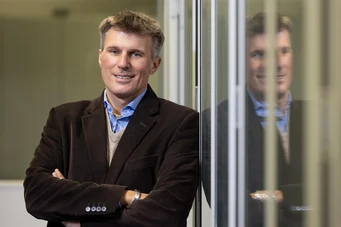Magnetism could become a new regulating factor in electrocatalysis. Prof. Karsten Reuter, Director of the Theory Department at the Fritz Haber Institute of the Max Planck Society and a e-conversion expert, has been awarded one of the 66 prestigious ERC Synergy Grants for “MAGNESIS—Magnetically Enhanced Electrocatalysis,” together with Prof. Galán-Mascarós (ICIQ, Spain), Prof. Jeppe V. Lauritsen (Aarhus University, Denmark), and Prof. David Écija (IMDEA Nanoscience, Spain). Over the next six years, the €12 million project will uncover how magnetic fields can help to drive electrochemical reactions more efficiently—from studying what happens at the atomic level to testing complete devices such as fuel cells and electrolyzers.

Prof. Dr. Karsten Reuter (Photo: J. Lösel/FHI)
As industries shift away from fossil fuels, electrocatalysis – using renewable electricity to drive chemical processes – offers a cleaner, greener way to make fuels and materials. Yet, these technologies still face significant hurdles, requiring major improvements in speed and efficiency. This is where “MAGNESIS: Magnetically Enhanced Electrocatalysis” comes into the picture, aiming to unlock the hidden potential of magnets to supercharge electrochemical reactions. Based on recent discoveries indicating that magnetic fields could dramatically enhance critical electrochemical reactions, MAGNESIS will systematically analyze the underlying effects and take this breakthrough out of the lab and into real-world applications.
“We aim to uncover how magnetic fields shape the chemical reactions that drive clean energy,” says Prof. Karsten Reuter. “By extending our computer models to include magnetism, we hope to unlock new ways to make electrocatalysis more efficient, enabling renewable-energy-driven chemical production, advancing materials research, and controlling reactions at the molecular level.”
Over the next six years, the international team will take on two of chemistry’s biggest challenges: splitting water and converting carbon dioxide, as the two crucial reactions for producing green hydrogen and renewable fuels. In electrocatalysis, these reactions are driven by the charge of the electrons in electric current. It now seems that they may also be influenced by their spin – a quantum mechanical property that is sensitive to magnetic fields. Using state-of-the-art experiments and advanced computer simulations, the team aims to uncover the fundamental rules behind this dependence and how they can be used to steer the reactions. The ultimate goal? To turn this knowledge into more efficient, eco-friendly devices that generate fuels and chemicals sustainably, powering the transition to a cleaner energy future.
 About the Partners
About the Partners
The funded consortium is coordinated by Prof. JR Galán‑Mascarós (ICIQ, Spain), whose team will combine expertise in electrochemistry with advanced light/X‑ray measurements. Prof. Reuter will lead the theory efforts with multiscale simulations under realistic electrochemical conditions. Prof. Jeppe V. Lauritsen (Aarhus University, Denmark) will examine the catalyst surfaces using real‑time microscopy and spectroscopy. Prof. David Écija (IMDEA) will probe nanoscale catalysts with state‑of‑the‑art microscopes and synchrotron methods.
About ERC Grants
The European Research Council (ERC) has awarded 66 Synergy Grants to 239 researchers, investing a total of €684 million. From 712 proposals submitted, around one in ten were selected, with each funded project receiving an average of €10.3 million. The projects will be hosted by universities and research centers across 26 countries in Europe and beyond. President of the European Research Council, Prof. Maria Leptin, said: “Collaboration is at the heart of the ERC Synergy Grants. In our latest round, teams of researchers will join forces to address the most complex scientific problems together – this time, they are more international than ever. The competition was fierce, with many outstanding proposals left unfunded. With more funds, the ERC could fully capitalize on this wealth of first-class science. Such scientific endeavors are what Europe needs to be at the real forefront”
Contact:
Prof. Dr. Karsten Reuter
Director of the Theory Department
Dr. Giulia Glorani
Scientific Coordinator
